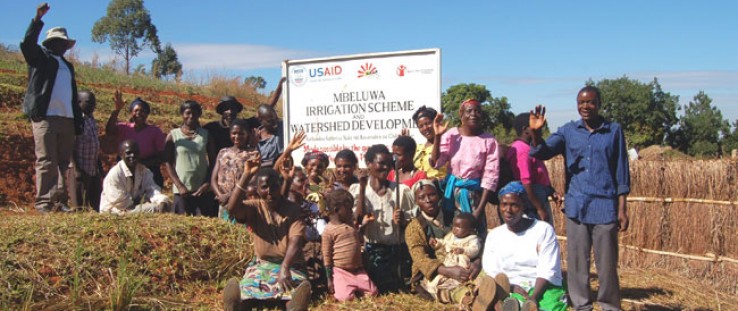 The people of Mbeluwa are proud of their joint efforts to increase their nutrition and food security.
Phyllis Craun-Selka
The people of Mbeluwa are proud of their joint efforts to increase their nutrition and food security.
Phyllis Craun-Selka
 The people of Mbeluwa are proud of their joint efforts to increase their nutrition and food security.
Phyllis Craun-Selka
The people of Mbeluwa are proud of their joint efforts to increase their nutrition and food security.
Phyllis Craun-Selka
By November 2012, it is well into the long hunger season in Malawi—and it’s getting longer every year. During the seven months from August to March, most farmers have already eaten or been forced to sell what few crops they were able to eke out from parched land. They usually sell at such low prices that they have no choice but to also sell off family assets to buy food, and still worry about how to pay for other necessities like school fees. Prices inch up and people take desperate measures to stay alive. Emergency food aid is needed nearly every year.
Malawi is somewhat smaller than the state of Pennsylvania and yet its land area supports 14 million people. Unfortunately, this southern African country has been largely deforested due to copious amounts of wood needed for firing the burnt bricks used in almost every building’s construction, for charcoal used in each meal’s cooking fires, and in clearing the land for farming.
Global climate change has complicated the problem. Much of southern Malawi can no longer count on traditional rain cycles. Some districts, such as Machinga in the Southern Region, live under rain shadows—areas on the leeward side of the mountains where winds push the dry heat upward and force promising rain clouds away from crops, extending drought season after season.
In a country where more than half the population lives below the poverty line, the Southern Region has the highest percentage of poor households. Malawians are mainly farmers, and with 85 percent of the population depending upon rain-fed agriculture, these recurring seasons of drought make it harder for people to feed their families—nearly one-quarter of Malawians don’t meet their daily food needs.
In light of these realities, it would be easy to see the situation as hopeless. But in eight southern districts, approximately 200,000 people, or six percent of those living there, are learning new ways of managing their livelihoods and changing their agricultural practices. They are leading others to follow their examples to restore their drought-stricken communities, with help from USAID.
USAID/Malawi’s $81 million, five-year food assistance program, Wellness and Agriculture for Life Advancement (WALA), “provides little in the way of inputs besides treadle pumps and a few other tools, but a lot in terms of techniques shared with farmers,” says USAID Food for Peace Officer Emmanuel Ngulube.
The small foot-powered pumps pull water from nearby rivers and streams to irrigate the land. Even more important than tools and techniques, is the message of the program.
"WALA does not just stand for Wellness and Agriculture for Life Advancement, but in Chichewa it means light; it stands for showing the way," Ngulube said. "The program is aimed at showing people the light so they can exercise their own stewardship of the land, and renew their confidence and resourcefulness to deal with drought as it affects all aspects of daily life."
Using the lessons from USAID conservation experts, rural communities learn to dig trenches that catch rain so that it seeps into the ground. They also plant indigenous trees that hold water in the soil. "We have flowing water in the stream longer into the dry season than we used to," Julia Nachisale told visitors in Chikwawa as she washed her family's laundry.
Motorizing, Diversifying and Scaring Away Hippos
After a failed rain-fed maize season, several communities bordering the Shire River that runs south from Lake Malawi are clamoring for more treadle pumps as they watch the river’s water flow to their young crops. One resourceful woman in Balaka, Ezelyn Kazamira, even figured out how to motorize her irrigation pump using her dividend from the USAID-sponsored Village Savings and Loan program, where members come together to pool their income each month and take turns borrowing against the lump sum.
Kazamira purchased a motorized pump to continuously pull water up and irrigate her land. Not only has this increased the area she uses to grow her maize, but others have seen her improved crops and have rented her motor, which has added more income to her household.
Lead farmers like John Biro in Machinga are diversifying their crops to include different vegetables and drought-resistant crops like pigeon peas, bananas, chilies and fresh maize because they yield more income and are more nutritious, especially for children. The 38-year-old, who is married with four children, conserves water for his family’s crops through mulching and mixing chicken manure with water to fertilize their fields when government fertilizer doesn’t make it to remote areas. An early adopter of conservation agriculture, Biro is crucial to the program’s success.
Says program manager William Kawenda: “As his successes repeatedly draw the attention of his neighbors, he has become a role model for others to follow.”
In Machinga, community members have devised a strategy to deal with the invading hippos that know exactly when the maize is ripe for eating—on a shift basis, one person spends each night in a hut by the field with the task of scaring the hippos away.
Community-led Learning and Sustainability
The people in Mbeluwa in Zomba district, where the program has been running since 2009, are proud of what they have achieved together. The Mbeluwa community has constructed a gravity irrigation scheme, bringing water down from Zomba Mountain to nourish their thirsty crops. They have also constructed a night water-storage catchment that doubles as a 50-by-50 foot fish pond.
Nutrition goes with good hygiene. In Balaka, the chief’s daughter, Flossie Kahinduka, demonstrates a simple hand-washing technique beside their toilet that is making incidence of diarrhea and cholera plummet. The WALA program’s peer training has sensitized community members on the importance of nutrition and hygiene.
Volunteer health promoters follow recipes using locally grown produce to help stretch their meager maize supplies. They teach their neighbors with flipcharts explaining the dos and don’ts of healthy living.
“This is one of the best ways of learning,” says Rhoda, whose last name has been withheld for privacy reasons. “We didn’t know the connection between good sanitation and [health]. We used to wash wherever we found water, even in a cooking pot. But now we know the link to illness and that is why we built our hand-washing system.”
Through these efforts, a significant proportion of the people in southern Malawi are using WALA ideas to generate signs of “hopeful light” in an area where drought threatens to snuff out hope for the future. With their determination to conserve water, diversify crops, generate income, and improve health and sanitation, the people of southern Malawi will steadily reduce the hunger season that currently looms throughout the year as they dedicate their energies to improving life as a whole.
Building Resilience to Natural Disasters
Malawi is prone to natural disasters like drought and floods, leading to food insecurity in many parts of the country. USAID, through the U.S. Government Feed the Future initiative, is supporting early warning systems that improve the quantity, quality and timeliness of information, and predict food security and vulnerability threats. The early warning systems monitor and assess environmental and socio-economic hazards that affect market price trends, nutrition and cross-border trade.







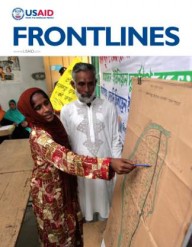

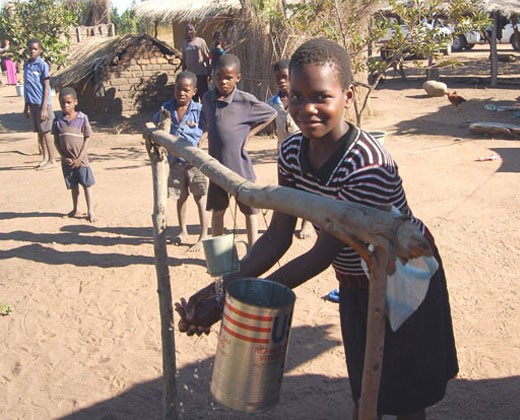
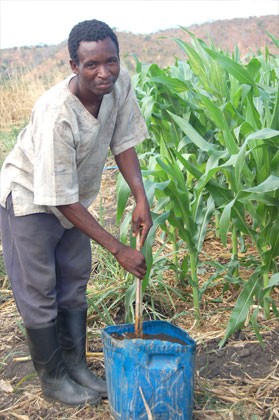
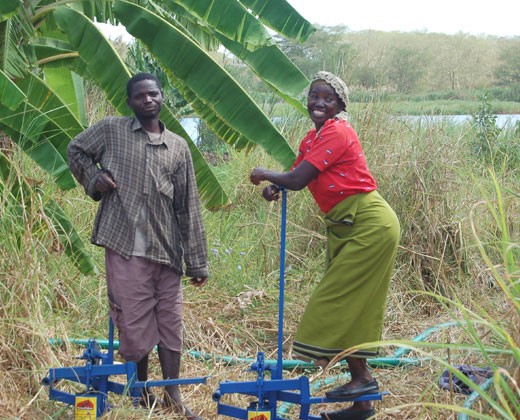
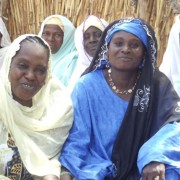
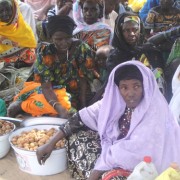
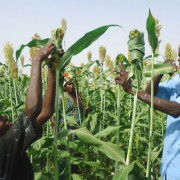
Comment
Make a general inquiry or suggest an improvement.